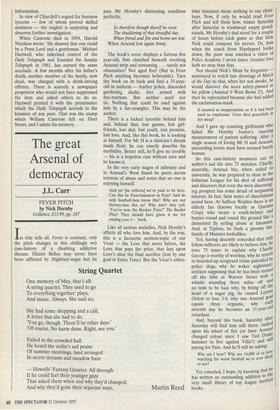The great Arsenal of democracy
J.L. Carr
FEVER PITCH by Nick Hornby Gollancz, f13.99, pp. 247 Its title tells all. Fever is constant, only the pitch changes in this chillingly wry case-history of a disabling addictive disease. Hilaire Belloc may never have been afflicted by Highbury-angst but he
puts Mr Hornby's distressing condition perfectly, So therefore though thyself be crost The shuddering of that dreadful day When friend and fire and home are lost When Arsenal lost again Away.
The book's cover displays a furious five year-old, fists clenched beneath overlong Arsenal strip and screaming . . . surely not obscenities? Not aged five! (But in Fever Pitch anything becomes believable). Turn the book on its back and find a 35-year- old in uniform — leather jerkin, discarded gardening slacks, feet armed with doc-martens. But neither scarf nor tie. Nothing that could be used against him by a fan-strangler. This may be the author.
There is a locked turnstile behind him and, behind that, lost games, lost girl- friends, lost dad, lost youth, lost promise, lost love. And, like this book, he is looking at himself. For Mr H is a clinician's dream made flesh: he can exactly describe his morbidity. Better still, he'll give no trouble — his is a hopeless case without cure and he knows it.
In the very early stages of infirmity and in Arsenal's West Stand he peers across torrents of abuse and notes that no one is enjoying himself.
And yet [he reflects] we've paid to be here. Can this be Entertainment as Pain? And do only football-fans know this? Why are not literary-fans like us? Why don't they yell, 'You've won the Booker Prize?' The Booker Prize! They should have given it me for reading your f— book.
Like all serious maladies, Nick Hornby's affects all who love him. And, by the way, this is a favourite sermon-topic of our Vicar — the Love that never falters, the Love that pays the price, that lays upon Love's altar the final sacrifice (lost by one goal in Extra Time). But the Vicar's olden-
String Quartet
One memory of May, that's all: A string quartet. They used to go To everything together: plays, And music. Always. She said no; She had some shopping and a call, A letter that she had to do.
`You go, though. There'll be-other days.' 'Of course. No harm done. Right, see you.'
Exiled in the crowded hall.
He heard the violin's sad praise Of summer mornings, land arranged In secret streams and meadow haze — Howells' Fantasy Quartet. All through It he could feel their younger gaze That asked them when and why they'd changed; And why they'd gone their separate ways.
Martin Reed
time instances mean nothing to our choir- boys. Now, if only he would read Fever Pitch and tell them how, winter Saturday after Saturday in windswept empty grand- stands, Mr Hornby's dad stood for a couple of hours before each game so that little Nick could compose his nerves. Or, how when the coach from Hartlepool broke down, the poor man watched a video of Police Academy 3 seven times. Greater love hath no man than that.
Nor should Nick's Mum be forgotten sentenced to watch late showings of Match of the Day so that, when her son awoke, he would discover the score safety-pinned to his pillow (Arsenal 0 West Brom 2!). And then be reproached because she had added the exclamation-mark.
It seemed as inappropriate as if it had been used to emphasise 'Gran died peacefully In her sleep!'
And I gave up counting girlfriends who failed Mr Hornby Junior's exacting measurement of patient suffering. After a single season of loving Mr H and Arsenal, succeeding lovers must have seemed barely human.
So this case-history measures out its author's sad life into 73 matches. Chiefly, naturally, Arsenal but, when exiled to university, he was prepared to slum in the Isthmian League for his shot of suffering and discovers that even the most discourag- ing prospect has some detail of surpassing interest. In fact, faint notes of cheerfulness sound here. At Saffron Walden there is an elderly fan (known locally as Quentin Crisp) who wears a crash-helmet and buzzes round and round the ground like a demented fly yelling abuse at linesmen. And, at Tiptree, he finds a gloomy fan" family of Munster lookalikes. Yet, having decently conceded that only fellow sufferers are likely to believe him, he tries 73 times to explain why Charlie George is worthy of worship, why he travels in boarded-up scrapyard trains patrolled by police dogs, why he wakes nightmare- stricken supposing that he has been turned off the tube at Warren Street with a whistle sounding three miles off and no taxis to be had, why, by biting off the head of a sugar pig, he caused LeYt°1 Orient to lose 3-0, why one Arsenal goal equals three orgasms, why each seventh day he becomes an 11-year-old retardant. And, beyond this book, Saturday after Saturday will find him still there, racked upon his wheel of fire (or have Arsenal changed colour since I saw Ted Drake. hammer in five against Villa?) and still paying for Pain. And he'll still be asking: Why am I here? Why are 14,000 of us here watching the worst football we're ever likely to see?
Yet consoled, I hope, by knowing that he has written an outstanding addition to th.e, very small library of top league football books.


























































 Previous page
Previous page